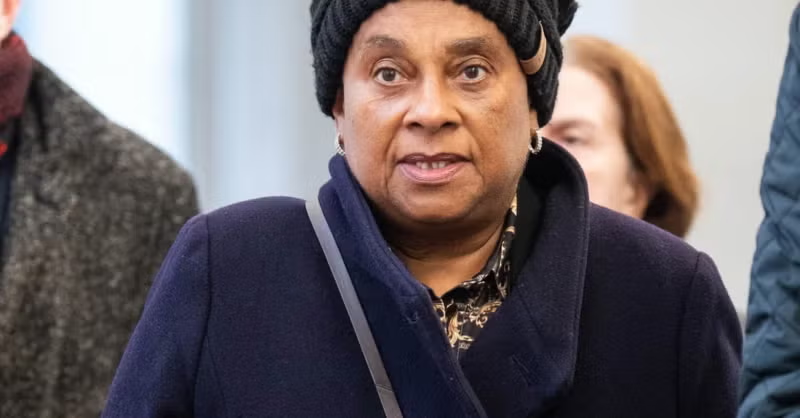DONALD Trump turned to “Hail Mary” tactics in a bid to delay his sentencing because he didn’t want to be a convicted felon heading into the White House, a former judge has told The U.S. Sun.
The president-elect, 78, desperately scrambled to avoid being sentenced after Judge Juan Merchan penciled in a date for January 10 – just days before the Inauguration.

Trump desperately tried to avoid being sentenced for his hush money conviction[/caption]

Trump’s team was accused of paying the porn star Stormy Daniels to keep an alleged affair under wraps[/caption]
Last week’s dramatic ruling came months after Trump was convicted over falsifying business records stemming from a hush money payment to the adult film star Stormy Daniels to keep an alleged affair under wraps.
Trump has vehemently denied claims surrounding the alleged affair.
The judge indefinitely suspended the sentencing following Trump’s comprehensive presidential election win in November, and it seemed the case would be stayed before the dramatic schedule shakeup.
It prompted Trump to file a motion with a New York appeals court, which was swiftly denied.
Trump then asked the Supreme Court to delay his sentencing.
The tycoon ultimately failed in his efforts, and it will go ahead today.
Judge John E. Jones, a former US district judge of the United States District Court for the Middle District of Pennsylvania, explained the motive behind Trump’s thinking.
And it revolved around Trump not wanting the moniker of being a convicted felon.
The New York Court of Appeals has denied the president-elect’s bid to pause the sentencing
And Jones told The U.S. Sun that Trump’s motion to the appellate court was a “bit of a Hail Mary.”
“He’s going to go into a full stall and try to litigate this in front of other courts to try to get the sentencing off for Friday,” he revealed earlier this week.
“The consequence of the case not being wrapped up before January 20 is the case likely dies in my view.
“He singularly focused on getting this sentencing out of Friday because he knows very well that constructively is going to be the death knell of the case.”
Trump tried to premise his appeal around the argument he had presidential immunity.
Can Donald Trump pardon himself?
DONALD Trump faced four separate indictments in 2024, prompting questions over what would happen if he won the presidential election. Now he has won the election, can he pardon himself?
Neama Rahmani, President of West Coast Lawyers, tells The U.S. Sun about the arguments still available to Trump to stop him being sentenced in the hush money case and if he can pardon himself once president:
Trump can’t pardon himself because it’s a New York state case.
The President can only pardon for federal crimes. There isn’t much Trump can do to get revenge because the judge has broad immunity.
Trump will be sentenced in the New York hush money case on January 10.
Judge Juan Merchan ruled that Trump isn’t immune (presidential immunity), and it will not affect his ability to govern (separation of powers and Supremacy Clause).
Trump is expected to receive a conditional discharge, which means he won’t receive a substantive sentence.
Even though there is a theoretical possibility of imprisonment or probation, they are logistically impractical.
Trump will certainly appeal the conviction to the New York Supreme Court Appellate Division, then the New York Court of Appeal, then the Supreme Court.
The real immediate question is whether the Appellate Division will step in to stop next week’s sentencing or if Trump will have to go through the normal appellate process, which will take months.
Trump had some success appealing in the New York civil fraud case, so this story is far from over.
Jones said Judge Merchan essentially wants to “ribbon tie” the case while Trump is resisting.
This is despite Merchan “tipping his hand” in a move not commonly seen in other cases, according to the ex-judge.
In his opinion, Merchan revealed that he was inclined to sentence him to unconditional discharge.
This would mean Trump would have the conviction on his record but face no penalties such as a fine or jail time.
“Merchan did that to blunt any argument that he was about to penalize Trump in a way that would interfere with his presidency,” Jones said.
Despite whatever ruling the judge hands down, Trump is expected to appeal any sentence.
“I’m sure he would appeal that determination,” he said.
“What the president-elect attempted to do is avoid being a convicted felon.
“The conviction doesn’t attach under the law until he’s sentenced.”
Jones warned Trump would be a convicted felon until an appeals court overturns any sentence given,
There is no guarantee that an appeals court would rule in Trump’s favor if a motion was filed.
Trump cannot appeal the jury’s verdict until he has been sentenced.
What is unconditional discharge sentence?
DONALD Trump will be sentenced today after he was convicted of falsifying business documents. Trump will appear virtually and is expected to be sentenced to unconditional discharge.
But what does this mean?
- Trump will have a conviction on his record.
- He will not serve any jail time or probation.
- He will not have to pay a fine.
- Trump will have the right to appeal the conviction.
Judge Juan Merchan, who is the judge presiding over the case, concluded in his opinion that “unconditional discharge” would be the most appropriate sentence because it allows the case to be wrapped up.,
Unconditional discharge is one of the most lenient sentences a judge can give.
Trump will not have to meet any conditions as part of his sentencing.
This is different from a conditional discharge sentence.
WRAP THE CASE
Jones warned how Trump would’ve been eligible for some sort of incarceration or supervisory probation as a punishment for the 34 felony counts he was convicted of.
However, the fact that Trump is set to troop back into the White House has reduced the number of punishment options available.
Jones said that a 10-day supervisory probation sentence would’ve impacted Trump’s transitional duties.
“Judge Merchan is thinking, ‘What’s the point?’” he added.
“At this juncture, he recognizes again the world has changed with Trump’s election.”
Jones believes that even if Trump had lost to Harris, he would not have ended up behind bars.
He said that the authorities would have some kind of responsibility to ensure he was safe.
NO JAIL TIME
Trump will also have protection from the Secret Service for the rest of his life.
And, New York authorities would’ve faced logistical challenges had he been slapped with a custodial sentence.
Jones noted that it would’ve been “awfully difficult” for an ex-president to serve his sentence on Rikers Island.
“I think there are all kinds of circumstances that would militate against incarcerating Trump,” he said.
“I don’t know what purpose that would have served.”
Trump will be unable to pardon himself after sentencing because it is a state, not a federal case.
In New York state, only the governor can issue a pardon.
During 2024, Trump was under investigation in federal cases over claims he mishandled classified documents at his Florida home, Mar-a-Lago, and allegations he was responsible for the January 6, 2021, insurrection.
But those cases never made it to trial – even though Trump was indicted.
Gregory Germain, a law professor at Syracuse University, speculated whether Trump would even accept a pardon.
“There’s really no consequences on the conviction other than the fact that it’s on his record,” he told The U.S. Sun.
“He’s not a young person who’s going to be looking for jobs or something where having a criminal conviction on his record matters.
“I think he wants to have a determination that he’s not guilty of this crime.”

Trump does not want the moniker of being a convicted felon[/caption]
Source link





























